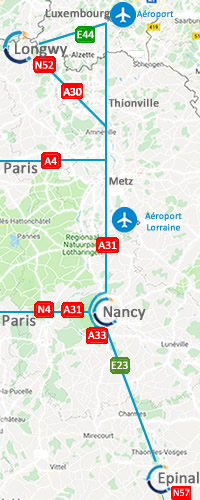
"Behavioral system theoretic approach to fault-tolerant control"
(Thèse Tushar JAIN)
Résumé :
The field of system and control theory has achieved an interdisciplinary status during the past five decades, and we refer to the theory that was developed during this period as the conventional control theory. This mainly relates to the study of automation and the design of controllers. A controller is a device that makes the interconnection with a given system so that the controlled system can behave in a desired way. In this thesis, we deal with the issues when the controlled system becomes faulty. The control of a faulty system addresses the concept of Fault-Tolerant Control System (FTCS). The study of such systems is in response to the demands of large-scale industries since from their viewpoint it is the foremost task to design control systems, which are capable of tolerating potential faults occurring either in the internal closed-loops or from the environmental factors in order to improve the reliability and availability of a system while providing the expected performance.
The work presented in this thesis is mainly focused on synthesizing the online controllers that guarantee the closed-loop system to be fault-tolerant at anytime. Two methodologies are proposed in this work, which rest under the broad classification of FTC systems, namely projection-based approach and online redesign approach. The novelty of these approaches lies in the fact that any a priori information about the plant is not available in real-time. In addition, no online identification or estimation of the operating plant is carried out. Rather, the re-configuration procedure of the controllers is solely based on the measurements generated by the unknown plant. This phenomenon is very nicely demonstrated by using the time-trajectory based viewpoint of behavioral theory. Within this mathematical framework, the interconnection between two dynamical systems, namely the plant and the controller, plays the significant role. Consequently, taking the benefits of this behavioral framework, the real-time measurement based solutions are proposed to handle the fault-tolerant control problem.
From the practical implementation viewpoint, the transient management during the controller reconfiguration mechanism is one of the important requirements for active FTCS. The last part of the thesis deals with the online implementation of the controllers within the behavioral framework, which takes care of the transient mechanism. The proposed approach guarantees the real-time smooth interconnection between the controller and the unknown plant. Moreover, in this part the application of the theory developed in the thesis is effectively demonstrated on real-world examples, namely the two-tank system, the aircraft landing mechanism, and the NREL's 5MW wind turbine system.
| Jury : | |
| - Rapporteurs : | Vincent COCQUEMPOT |
| Ron PATTON | |
| - Autres membres : | Prof. Abdellah EL MOUDNI, Université de Technologie de Belfort-Montbéliard, France ; Prof. Didier MAQUIN, Université de Lorraine, France ; Prof. Dominique SAUTER, Université de Lorraine, France (Directeur de thèse) ; Dr. Joseph Julien YAMÉ, Université de Lorraine, France (Co-directeur de thèse). |






